In our previous blog post we had discussed about What is CSP in Salesforce In these blog post we discuss about What is Platform Event in Salesforce
Contents
- 1 Introduction
- 2 Understanding Platform Events
- 3 How Platform Events Work
- 4 Creating Platform Events
- 5 Publishing Platform Events
- 6 Subscribing to Platform Events
- 7 Use Cases of Platform Events
- 8 Advantages of Platform Events
- 9 Limitations and Considerations
- 10 Best Practices for Implementing Platform Events
- 11 Troubleshooting Platform Events
- 12 Platform Events vs. Other Integration Options
- 13 Security and Compliance
- 14 Future of Platform Events
- 15 Conclusion
- 16 FAQs
What is Platform Event in Salesforce
Introduction
Salesforce is renowned for its robust ecosystem and integration capabilities. One standout feature that enhances its flexibility is Platform Events. But what exactly are Platform Events, and why should you care about them? Let’s dive in and explore the intricacies of Platform Events in Salesforce.
Understanding Platform Events
Definition and Purpose
Platform Events are a powerful mechanism in Salesforce that enable real-time communication between systems. They allow different parts of a Salesforce environment or even external systems to communicate asynchronously through event-driven architecture. Think of Platform Events as a way for different software components to “talk” to each other without waiting for a response.
Key Characteristics
Platform Events are highly scalable and can handle large volumes of events. They are designed to work asynchronously, which means they don’t wait for an immediate response. This makes them ideal for scenarios where instant feedback isn’t necessary, but data needs to be processed eventually.
How Platform Events Work
Event-Driven Architecture
In an event-driven architecture, events are emitted (published) and then processed (consumed) by different components. This decouples the producer and consumer, allowing them to operate independently. Platform Events follow this model, ensuring that data can flow seamlessly between systems without creating dependencies.
Event Producers and Consumers
- Producers: These are the entities that publish events. In Salesforce, this could be an Apex trigger, a Lightning component, or even an external application.
- Consumers: These are the entities that subscribe to events and process them. This could be another Apex trigger, a process builder, or an external system.
Creating Platform Events
Steps to Create a Platform Event
Login to Salesforce Account
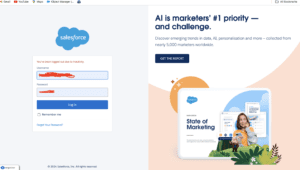
Click Gear icon Navigate to Setup
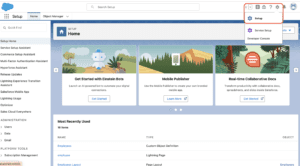
Search Quick find box Platform events
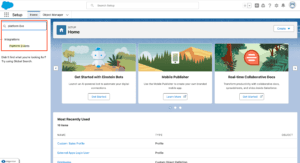
Click New Platform Event
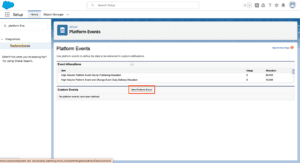
Fill the Necessary details like the event name and description
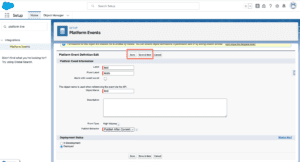
Add event fields that the event will carry and these fields define the data structure of the event
Defining Event Fields
Event fields are similar to object fields in Salesforce. They define the data that the event will carry. This can include text fields, number fields, date fields, and more.
Publishing Platform Events
Methods to Publish Events
There are several ways to publish Platform Events in Salesforce:
- Apex Code: Use the
EventBus.publish()method to publish events from Apex. - Process Builder: Configure a process to publish events when certain conditions are met.
- Flows: Use Flows to automate the publication of events based on user actions or system changes.
Best Practices for Publishing
- Ensure that events are published only when necessary to avoid unnecessary processing.
- Use batch processing to publish events in bulk if dealing with large volumes of data.
Subscribing to Platform Events
Types of Subscriptions
- Apex Triggers: Write triggers to listen to Platform Events and process them.
- Process Builder: Set up processes to handle events and take actions.
- External Systems: Use external systems to subscribe to events via CometD or other streaming APIs.
Subscription Methods
- Apex Triggers: Create an after insert trigger on the Platform Event object to process incoming events.
- Process Builder: Create a process that triggers on the creation of a Platform Event.
Use Cases of Platform Events
Real-World Examples
- Order Processing: Trigger events when an order is placed and handle inventory updates asynchronously.
- Customer Notifications: Send notifications to customers based on certain triggers without delay.
Industry Applications
- Finance: Streamline transaction processing and fraud detection.
- Healthcare: Manage patient data and appointment scheduling seamlessly.
Advantages of Platform Events
Scalability and Flexibility
Platform Events can handle large volumes of data efficiently, making them suitable for enterprises with high data throughput needs.
Asynchronous Processing
They enable asynchronous processing, which helps in decoupling systems and improving performance.
Limitations and Considerations
Limits and Quotas
Salesforce imposes limits on the number of events that can be published and consumed. It’s essential to be aware of these limits to avoid hitting quotas.
Design Considerations
Design your system to handle retries and error processing, as asynchronous systems can sometimes face delays or failures.
Best Practices for Implementing Platform Events
Design Strategies
- Use meaningful event names and field names to make the data easy to understand.
- Ensure idempotency in event processing to handle duplicate events gracefully.
Performance Optimization
- Batch process events where possible.
- Optimize event payloads to include only necessary data.
Troubleshooting Platform Events
Common Issues
- Event Delivery Failures: Events may fail to deliver due to network issues or system downtime.
- Processing Errors: Errors in processing logic can cause events to fail.
Solutions and Workarounds
- Implement retry logic in your processing code.
- Use Salesforce’s monitoring tools to track event delivery and processing.
Platform Events vs. Other Integration Options
Comparison with Apex Callouts
- Apex Callouts: Synchronous and require a response.
- Platform Events: Asynchronous and do not require an immediate response.
Comparison with Salesforce Connect
- Salesforce Connect: Used for real-time data integration with external systems.
- Platform Events: Ideal for event-driven architectures where data can be processed asynchronously.
Security and Compliance
Data Security Measures
Platform Events are subject to Salesforce’s robust security measures, including encryption and access controls.
Compliance with Regulations
Ensure that your use of Platform Events complies with relevant data protection regulations like GDPR and CCPA.
Future of Platform Events
Trends and Predictions
The use of event-driven architecture is on the rise, and Platform Events are expected to play a significant role in this trend.
Upcoming Features in Salesforce
Salesforce continuously enhances Platform Events, with features like enhanced monitoring and more integration options on the horizon.
Conclusion
Platform Events are a vital component of Salesforce’s integration toolkit. They enable real-time, asynchronous communication between systems, making them ideal for a wide range of use cases. By understanding their capabilities and limitations, you can leverage Platform Events to build scalable, efficient solutions in Salesforce.
We want to more about What is Platform Event in Salesforce Click Here
FAQs
What are platform events in Salesforce?
Platform Events are a mechanism for real-time, event-driven communication between different parts of a Salesforce environment or with external systems.
How do you create a platform event in Salesforce?
To create a Platform Event, navigate to Setup, search for ‘Platform Events’, and create a new event by defining its name and fields.
What are the benefits of using platform events?
Benefits include scalability, asynchronous processing, and the ability to decouple systems for better performance.
Can platform events be used for real-time data processing?
Yes, Platform Events are designed for real-time data processing, allowing systems to communicate instantly.
What are the limitations of platform events?
Limitations include Salesforce’s imposed quotas on event publication and consumption, and the need for careful design to handle asynchronous processing.
In our next blog post we will discuss about What is Change Set in Salesforce
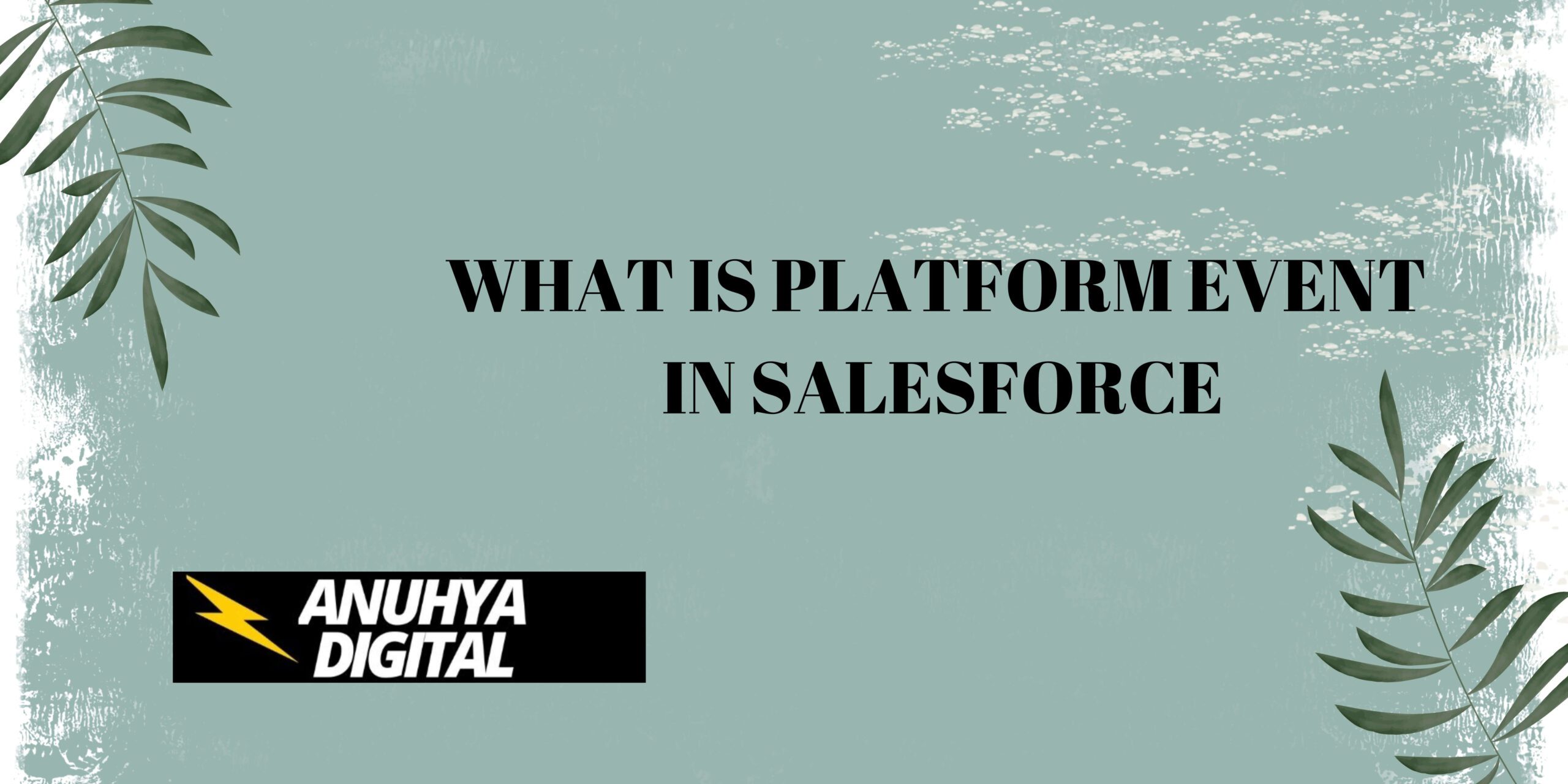
2 thoughts on “What is Platform Event in Salesforce”